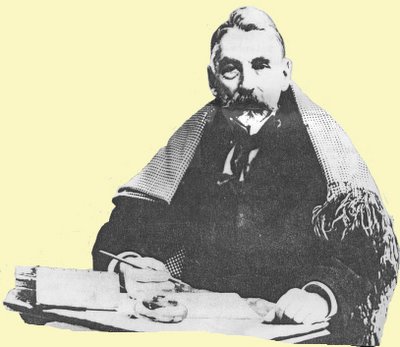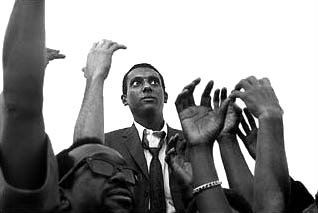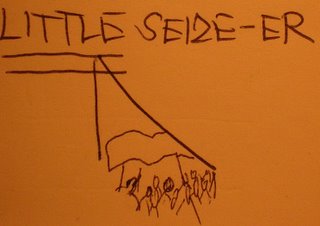
November 27, 2005
 Your act is always applied to paper; for meditating without leaving any traces becomes evanescent, nor should instinct be exalted in some vehement and lost gesture that you sought.
Your act is always applied to paper; for meditating without leaving any traces becomes evanescent, nor should instinct be exalted in some vehement and lost gesture that you sought.To write--
The inkstand, crystal as a conscience, within its depths its drops of shadow relative to having something be: then take the lamp away.
You noticed, one does not write luminously on a dark field; the alphabet of stars alone, in thus indicated, sketched out or interrupted...
November 14, 2005
November 12, 2005

By way of an explanation, KINO SLANG, I ought to recall the words of Stokely C. on one particularly grand tradition of resistance by way of language:
"Now then, we have to understand what is going on, not only in this country, but the world, especially in Africa. Because we are an African people, nothing else. We have ALWAYS been an African people. We have ALWAYS maintained our own value system, and I will prove that to you. As much as he has tried, our people have resisted for 413 years in this wilderness, and they resisted for this generation to carry out what must be done. We cannot fail our ancestors [applause]...cannot fail our ancestors...cannot fail our ancestors. We resisted in every way you can point to.
"Take the English language. There are cats who come here from Italy, from Germany, from Poland, from France. In two generations they speak English perfectly. We have NEVER spoken English correctly! [applause] Never have we spoken English correctly. Never! Never! Never! And that is because our people consciously resisted a language that did not belong to us--never did, never will. Anyhow they try to run it down our throats, we ain't going to have it! We ain't going to have it! You must understand that as a level of resistance. Anybody can speak that simple honky's language correctly. Anybody can do it. We have not done it because we have resisted...resisted. "
(Feb 1968)
*

Philippe Roger: Doesn't that come back to an almost militant idea of cinema's usefulness?
Serge Daney: Why not?
(from "The Smuggler", CINEMA IN TRANSIT)
_________________________
Because Daney put it so clearly in the interview that surrounds this 'why not?', we will quote him below. Why? Because we believe in a return to militant cinema. This is not only in regard to making films, which is very broad, but also to interpreting them. It means attempting to understand the way that "all films are militant films" (Daney again) speaking in someone's interest. It means wondering how aesthetics could possibly improve anything.
-a.r.
_________________________
(...)
P.R.: The author’s ‘vision of the world’ would then be primarily a spatial, concrete point of view?
S.D.: This phrase ‘point of view’ has to be taken seriously. The point of view is a concrete situation in a cluttered landscape. It is subjective and, at the same time, it creates the objective. If I enter Lang’s point of view, I’m well aware that there are things which from that point of view cannot be seen at all, but I know that even because of this blind spot, there are things that I can only see with Lang. This is what now allows me to understand the amazing success of the phrase ‘mise en scene’ with the likes of us. The mise en scene is what shows up fracture points, oblique openings, suture or ‘padding’; you can slip inside a mise en scene, thanks to a change of shot, like a stowaway on board the film. You can learn about distances; the art of holding them, reducing them, sustaining them. In short, you can hole up, take in the whole picture, and that’s very useful in life.
Later, my ‘case’ seemed pretty banal. The cinephile is an orphan who chooses to be kidnapped by a rather special passer-by who launches him, but not just any old way, on his apprenticeship in the world. There’s a film which tells this story, the cinephile myth incarnate; it’s Lang’s Moonfleet. Nobody learns as fast from Jeremy Fox than the young John Mohune.
Obviously, if the auteur is like a father, you don’t make an alliance with him so as to go and have some fun with the other children. You make an alliance with him so he will show you the gravity of the world. In Lang, for example, children are the ones who should not be lied to.
P.R.: Whether it’s in The Ghosts of the Continuous or in more recent articles, including what you’ve written about the Gulf War, we find the idea that film should be a tool for conceiving the world.
S.D.: It’s like people who’ve done Latin and who suddenly realise that it’s usefiul to them in the modern world. The cinema is a fine tool for looking at what maybe comes after cinema. We ought to be able to say: ‘When you love life, you do film criticism of life’. If that idea could be smuggled into this book, I’d be happy. For me, making the most of cinephilia is talking to students at the FEMIS at the start of the (Gulf) war, and telling them that shot-countershot is not a dated stylistic device, but an idea. An idea so absent from TV that it immediately makes sense to look at Fritz Lang, who was concerned with nothing but that. So long as film students thought it was clever to feel so superior to TV, there wasn’t much you could tell them. But when they find a war on the small screen for the first time in their lives, and this war shakes them up or depresses them, you can take the opportunity to tell them that concepts like ‘montage’ or ‘close-up’ are gifts that the cinema makes to the twentieth century and they’re there for us to make use of them.
P.R.: Doesn’t that come back to an almost militant idea of cinema’s usefulness?
S.D.: Why not? It was probably easier for people of my generation who often encountered films like Night and Fog very early along their road. And who, rather than any unlikely ‘pleasure’, experienced a feeling of pride, despite everything, at having the cinema, the only art capable of maintaining its dignity at the level of such events, and of informing and forming. So I’m pleased that this idea I’m trotting out again - that the cinema is realist, that it records and bears witness - should also come from that war and be a product of its immediate aftermath.
Subscribe to:
Comments (Atom)
Archive
- October 2005 (1)
- November 2005 (6)
- December 2005 (6)
- January 2006 (1)
- February 2006 (9)
- March 2006 (2)
- April 2006 (3)
- May 2006 (2)
- June 2006 (3)
- July 2006 (14)
- August 2006 (11)
- September 2006 (5)
- October 2006 (9)
- November 2006 (3)
- December 2006 (5)
- January 2007 (6)
- February 2007 (7)
- March 2007 (6)
- April 2007 (3)
- May 2007 (1)
- June 2007 (7)
- July 2007 (2)
- August 2007 (3)
- October 2007 (4)
- November 2007 (5)
- December 2007 (3)
- January 2008 (2)
- February 2008 (2)
- March 2008 (4)
- May 2008 (3)
- June 2008 (2)
- July 2008 (3)
- August 2008 (3)
- September 2008 (4)
- October 2008 (3)
- November 2008 (1)
- December 2008 (3)
- January 2009 (3)
- March 2009 (5)
- April 2009 (3)
- May 2009 (11)
- June 2009 (6)
- July 2009 (2)
- August 2009 (6)
- September 2009 (2)
- December 2009 (1)
- January 2010 (2)
- February 2010 (1)
- March 2010 (2)
- April 2010 (10)
- May 2010 (4)
- June 2010 (1)
- July 2010 (1)
- August 2010 (1)
- September 2010 (2)
- October 2010 (1)
- November 2010 (4)
- December 2010 (3)
- January 2011 (2)
- February 2011 (5)
- March 2011 (6)
- April 2011 (3)
- May 2011 (3)
- June 2011 (5)
- July 2011 (2)
- September 2011 (1)
- October 2011 (3)
- November 2011 (3)
- December 2011 (1)
- January 2012 (2)
- February 2012 (7)
- March 2012 (10)
- April 2012 (7)
- May 2012 (11)
- June 2012 (3)
- July 2012 (3)
- August 2012 (2)
- September 2012 (1)
- October 2012 (9)
- November 2012 (10)
- December 2012 (6)
- January 2013 (3)
- February 2013 (4)
- March 2013 (4)
- April 2013 (4)
- May 2013 (3)
- June 2013 (4)
- July 2013 (4)
- August 2013 (2)
- September 2013 (7)
- October 2013 (6)
- November 2013 (2)
- December 2013 (4)
- January 2014 (4)
- February 2014 (6)
- March 2014 (7)
- April 2014 (5)
- May 2014 (4)
- June 2014 (6)
- July 2014 (2)
- August 2014 (5)
- September 2014 (1)
- October 2014 (1)
- January 2015 (1)
- April 2015 (1)
- July 2015 (1)
- September 2015 (2)
- October 2015 (1)
- December 2015 (1)
- January 2016 (1)
- February 2016 (2)
- March 2016 (1)
- April 2016 (1)
- May 2016 (2)
- June 2016 (1)
- July 2016 (3)
- August 2016 (1)
- September 2016 (2)
- October 2016 (2)
- December 2016 (3)
- January 2017 (1)
- February 2017 (2)
- May 2017 (3)
- July 2017 (3)
- October 2017 (3)
- November 2017 (1)
- December 2017 (1)
- January 2018 (2)
- February 2018 (2)
- March 2018 (4)
- April 2018 (1)
- May 2018 (3)
- July 2018 (1)
- August 2018 (1)
- January 2019 (1)
- March 2019 (3)
- May 2019 (3)
- July 2019 (1)
- August 2019 (2)
- September 2019 (2)
- October 2019 (1)
- November 2019 (2)
- December 2019 (1)
- January 2020 (3)
- February 2020 (2)
- April 2020 (4)
- May 2020 (1)
- October 2020 (1)
- December 2020 (1)
- March 2021 (1)
- April 2021 (1)
- May 2021 (1)
- October 2021 (1)
- January 2022 (2)
- March 2022 (1)
- April 2022 (2)
- May 2022 (3)
- May 2023 (1)
- October 2023 (3)
- January 2024 (1)
- May 2024 (1)
- September 2024 (1)
- October 2024 (2)
- December 2024 (1)
- May 2025 (1)
- August 2025 (1)



